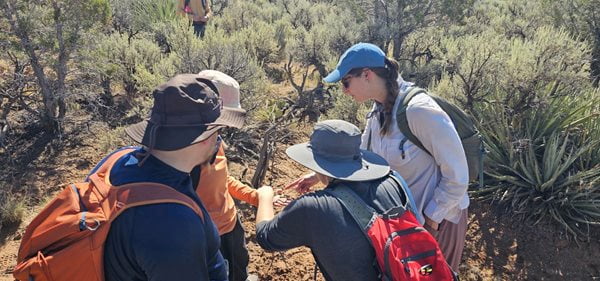Box 19617, Arlington, TX 76019
Phone: 817-272-3291
UTA Sociology and Anthropology Department Students Complete Hands-On CRM Field School in the Four Corners Region
 Archaeological work mandated by cultural resource protection laws is facing a critical shortage of qualified entry-level professionals. To address this industry need, the Cultural Resource Management Field school was designed by Kelsey E. Hanson (Assistant Professor, UTA) and James M. Potter (CCAC) to provide students with the practical skills necessary for entry-level positions. The field school takes place at the Crow Canyon Archaeological Center (CCAC) campus in Cortez, Colorado and is offered for college credit through the Department of Sociology and Anthropology at UTA.
Archaeological work mandated by cultural resource protection laws is facing a critical shortage of qualified entry-level professionals. To address this industry need, the Cultural Resource Management Field school was designed by Kelsey E. Hanson (Assistant Professor, UTA) and James M. Potter (CCAC) to provide students with the practical skills necessary for entry-level positions. The field school takes place at the Crow Canyon Archaeological Center (CCAC) campus in Cortez, Colorado and is offered for college credit through the Department of Sociology and Anthropology at UTA.
Skills Gained:
This intensive two-week program directly prepares students to meet the specific demands of today’s archaeology job market. This past summer, eleven students from across the nation participated in the field school from June 28 to July 12, 2025. Under the guidance of diverse archaeologists, industry professionals, and Indigenous descendant community members, students received hands-on training in pedestrian survey, site recording, and the use of digital tools like ArcGIS Field Maps. Students applied these skills in a simulated CRM project at the Hawkins Preserve, learning to evaluate archaeological sites for the National Register of Historic Places and under crucial cultural heritage laws. The 2025 curriculum was further enriched with Indigenous-led lectures, experimental archaeology, and an introduction to geophysical survey.
Lessons Learned:
A particularly powerful lesson in the importance of quality site documentation occurred when students documented new vandalism on a previously recorded rock art panel. Among the imagery was a pictograph of a bear paw that was previously suggested to be affiliated with the Ute Tribe. Upon revisitation in 2025, this year’s student body observed several new instances of vandalism and graffiti that completely obliterated the pictograph. While painful, this experience demonstrated the fragility of archaeological sites and stressed the importance of documenting the condition of cultural resources to the best of one’s ability.

Independent Student Research and Presentations:
During the field school, one student, Will Ryan, also completed a research project supported by the Undergraduate Research Opportunities Program (UROP) testing the efficacy of recreation-grade drones in recording archaeological sites. The results were presented at the UTA UROP Poster Showcase and at the 97th Annual Pecos Conference in Blanding, UT, titled: “Low-Cost Drones in Archaeology: Evaluating Recreation-Grade UAVs for Site Documentation at the Hawkins Preserve.” Kelsey Hanson serves as his faculty mentor and they are continuing the project with support from the University of Texas at Arlington Research Institute, also known as UTARI.
Kelsey Hanson also spoke about the CRM Field School at the Pecos Conference, in a talk titled “Preparing Students for Tomorrow’s Archaeology: Lessons from the Crow Canyon CRM Field School.” The response from CRM professionals was overwhelmingly positive. They are thankful that this program exists and are eager to hire graduates of the program.
Outcomes and Future Directions:
This unique program has been highly effective in preparing students for CRM careers. Since its inaugural 2024 season, 80% of graduates who have completed their degrees now hold entry-level CRM positions in private firms or government agencies. The CRM Field School will be offered again in Summer 2026, providing students with a direct pathway to developing in-demand skills and launching a fulfilling career in cultural resource management.
For more information on how to participate for college credit, contact Kelsey Hanson ([email protected]).